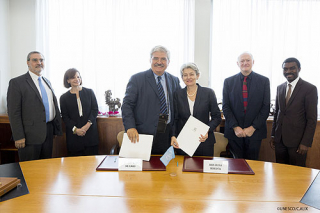The United Nations Educational, Scientific and Cultural Organization (UNESCO) and the International Centre for the Study of the Preservation and Restoration of Cultural Property (ICCROM) signed a landmark agreement on Friday 13 October in a new effort to address mounting threats to cultural properties worldwide.
Under the Memorandum of Understanding (MoU) signed at UNESCO’s Paris headquarters, the two agencies agreed to intensify efforts to implement the 1972 World Heritage Convention. They will also boost cooperation in addressing a number of specific challenges, including destruction of cultural property in armed conflict, disaster risk management, illicit trafficking in heritage objects and new risks to intangible cultural heritage.
“The agreement stems from our joint commitment to protect cultural heritage endangered by ever-increasing hazards of both natural and human origin, including pillage and neglect,” said ICCROM’s Director-General, Dr Stefano De Caro.
“UNESCO and ICCROM have intensified their cooperation to respond to the new threats of cultural cleansing and systematic destruction of heritage. This agreement is a step further to foster new and long-term responses to protect sites and share a narrative about our shared heritage as a force for peace,” declared UNESCO Director-General, Irina Bokova.
The agreement represents a new milestone in the long-term partnership between UNESCO and ICCROM, who for many years have worked together to protect cultural heritage and preservation, most notably for the implementation of the World Heritage Convention. Under the agreement, the agencies will increase their cooperation on training and capacity-building, especially in the Middle East, the Arab world and sub-Saharan Africa, as well as on creating and sharing information resources and on public outreach and advocacy to support heritage conservation work.
The two organizations also agreed to work closely to integrate fundraising activities and streamline management and administrative processes, so as to make their joint programmes more cost efficient and better aligned with the priorities of Member States and the donor community.
ICCROM was created as a result of a 1956 decision of UNESCO’s General Conference in New Delhi to establish a centre dedicated to the study of questions related to heritage conservation and protection. ICCROM is located in Rome, Italy, and has a Regional Office in Sharjah, United Arab Emirates. UNESCO is the United Nations Educational, Scientific and Cultural Organization, established in the aftermath of the Second World War, based in Paris, France and with 53 field offices around the world.

